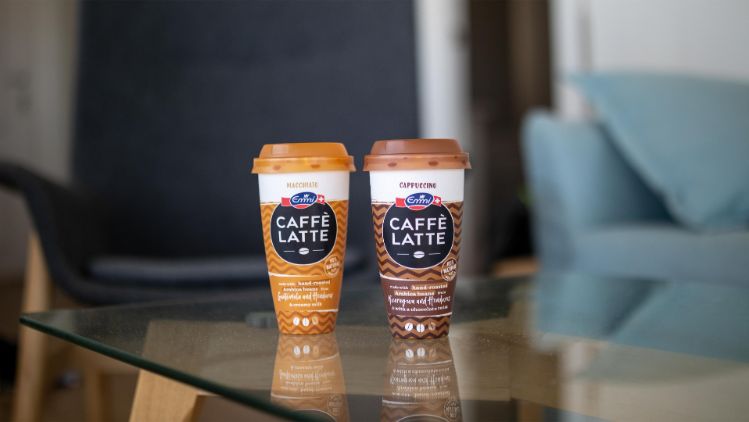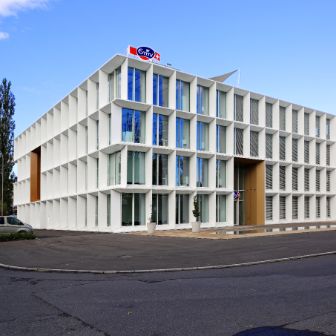
Recycled plastic for Emmi Caffè Latte cups
Emmi is committed to a circular economy under its sustainability strategy. By 2027, the company wants to use solely recyclable packaging and increase the proportion of recycled materials to at least 30 %. Emmi is starting with its successful Emmi Caffè Latte brand. From September, the cups will contain a proportion of recycled polypropylene.
Under its sustainability strategy, Emmi has set itself the goal of switching to recyclable packaging by 2027. In addition, packaging is to be made up of one third recycled material until that date.
Currently, the existing packaging and waste system is dominated by disposable packaging and linear production systems. “In our view, the waste of valuable resources in the packaging sector is unsustainable. Accordingly, Emmi is actively committed to optimising, reducing and closing energy and material cycles in its own production processes and in conjunction with partners and organisations, including as a founding member of PRISMA,” says Gerold Schatt, Head of Sustainability at the Emmi Group.
Emmi Caffè Latte is setting an example for the circular economy
However, there are two major obstacles on the road towards economical and widely accepted recycling systems in the packaging sector: Firstly, recyclable packaging materials must be used; and secondly, a nationwide system must be established for collection and processing of these materials. This change calls for contributions from as many stakeholders as possible – from producers and processors to retailers and consumers and, not least of all, authorities and legislators.
As a major purchaser of packaging, Emmi wants to work with partners in the packaging industry to provide impetus for environmentally friendly and resource-saving packaging. For example, by using recycled materials in their packaging. If these are in demand, this creates an incentive to collect and process the corresponding packaging. Emmi is now making a conscious first step with its most successful brand, Emmi Caffè Latte. From September 2021, the first cups with recycled content will be available in the chiller cabinet.
Made possible thanks to technological advances
The legal requirements are strict when it comes to packaging for food. Only a few materials are even approved for this purpose. Recycled polypropylene from mechanical recycling (rPP) is not approved by food safety authorities, such as the European Food Safety Association (EFSA). This does not apply to polypropylene from chemical recycling (circular polypropylene or cPP).
However, the new technology for sourcing cPP is still in its infancy. For this reason, cPP is currently only available in limited quantities. Emmi was one of only a small number of food manufacturers to secure a share of cPP – thanks in part to its early commitment and close ties with long-standing partners Greiner Packaging and Borealis.
Starting with 100 tons of recyclate
Emmi initially plans to use 100 tonnes of cPP per year for its Emmi Caffè Latte cups. In a preliminary step, the material will be used in the UK market. As things stand today, large industrial quantities of cPP will only be available in a few years’ time. Over the coming years, Emmi will continue to broaden the use of recycled materials in its cups and in the European market as quickly as possible.
Contacts
Emmi Corporate Communications, Sibylle Umiker, Head of Media Relations | media@emmi.com | +41 (0)58 227 50 66
SPS MARKETING GmbH, Roland Kaiblinger, Account Executive | r.kaiblinger@sps-marketing.com | +43 (0) 732 60 50 38 29
Borealis Corporate Communications, Virginia Wieser, Senior Manager | Virginia.Wieser@borealisgroup.com | +43 (0) 122 40 07 72
About "circular polypropylene (cPP)"
Recovering plastic from plastic packaging: Chemical recycling enables chemical raw materials to be recovered from plastic waste that is otherwise difficult to recycle mechanically – an important part of the solution for increasing recycling rates, and for preventing plastic waste from being landfilled or incinerated and thus keeping it in the cycle as a raw material. These materials have the same properties as plastics from traditional production (“virgin plastics”) and are approved for use with food.

About Emmi
Emmi is the leading milk processor in Switzerland. The company dates back to 1907, when it was founded by 62 dairy farming cooperatives around Lucerne. Over the past 20 years, Emmi has grown into an international, listed group. It has for many years pursued a successful strategy based on three pillars: strengthening its Swiss domestic market, international growth and cost management. Throughout its corporate history, Emmi’s keen awareness of its responsibility to society, animal welfare and the environment has been fundamental to its mission.
In Switzerland, Emmi manufactures a comprehensive range of dairy products for its own brands and private label products for customers, including leading exports such as Emmi Caffè Latte and Kaltbach. In other countries, its products – mainly speciality products – are manufactured locally. Alongside cow’s milk, it also processes goat’s and sheep’s milk.
In Switzerland, the Emmi Group has 25 production sites. Abroad, Emmi and its subsidiaries have a presence in 14 countries, eight of which have production facilities. Emmi exports products from Switzerland to around 60 countries. Its business activities focus on the Swiss domestic market as well as western Europe and the American continent. Roughly half of its CHF 3.7 billion in sales – about 10 % of which stems from organic products – is generated in Switzerland, the other half abroad and over two-thirds of its around 8,900 employees are based outside of Switzerland.
About Greiner Packaging
Greiner Packaging is one of the leading European manufacturers of plastic packaging in the food and non-food sector. For over 60 years, the company has been committed to high problem-solving competence in development, design, production and decoration. Greiner Packaging addresses market challenges through its two business units: Packaging and Assistec. While the former provides innovative packaging solutions, the latter concentrates on the production of tailor-made technical components. Greiner Packaging employs around 4,900 people at more than 30 locations in 19 countries worldwide. In 2020, the company generated annual revenue of EUR 692 million (incl. joint ventures). This is more than 35 % of Greiner’s total sales.
About Borealis
Borealis is one of the world’s leading suppliers of advanced and recycling-oriented polyolefin solutions and the European market leader in basic chemicals, plant nutrients and mechanical recycling of plastics. We leverage our polymer-related expertise and decades of experience to deliver innovative and value-added recycling solutions to key industries. We are always developing new concepts to make our lives even more sustainable. We build on our commitment to safety, our people and excellence as we accelerate the shift to a circular economy and broaden our geographic footprint.
Borealis has its headquarters in Vienna, Austria, employs around 6,900 people and is active in more than 120 countries. In 2020, Borealis generated sales of EUR 6.8 billion and net profit of EUR 589 million. Borealis is 75% owned by OMV, an integrated international natural gas company based in Austria, and 25% owned by a holding company of Mubadala, based in the United Arab Emirates. Together with two important joint ventures – Borouge (with Abu Dhabi National Oil Company, ADNOC, in the United Arab Emirates) and Baystar™ (with TotalEnergies, in the United States), Borealis supplies products and services to customers around the world.
